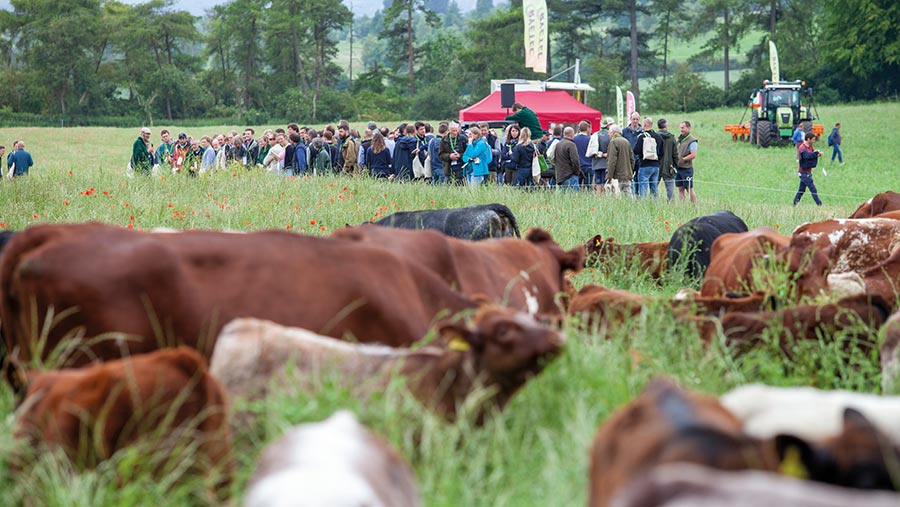Groundswell stirs debate over certified regen farming standards
 © Jane Craigie Marketing
© Jane Craigie Marketing Debate is intensifying over whether regenerative agriculture should be properly monitored and certified to prevent people jumping on the bandwagon without abiding by its principles.
The increasing popularity of regen farming methods has sparked concern that anyone can describe themselves as a “regen farmer” without adopting practices that improve soil health and enhance biodiversity (see “Five principles of regenerative agriculture”).
The issue came to the fore as thousands of farmers descended on Lannock Manor Farm, Stevenage, Hertfordshire, for the sixth annual Groundswell event, which celebrates regenerative agriculture.
See also: 3 arable farmers, 3 regenerative agriculture journeys
Five principles of regenerative agriculture
- Don’t disturb the soil
- Keep the soil surface covered
- Keep living roots in the soil
- Grow a diverse range of crops
- Bring grazing animals back to the land
Source: Groundswell
While some farming practices, including organic and integrated pest management (IPM), are certified, there is no such requirement for regen farmers.
However, some are looking at being certified on a voluntary basis.
Challacombe Farm in Dartmoor, part of the Duchy of Cornwall estate, claims to be the first farm to be regen certified in the UK, under the A Greener World (AGW) scheme.
Standards
Naomi Oakley and Mark Owen farm a herd of Welsh Black and North Devon beef cattle, plus a flock of about 200 Icelandic and Shetland sheep, and the upland farm is among 50 others across the globe in AGW’s Certified Regenerative Pilot cohort.
It has spent 18 months evaluating farm standards and auditing, including carbon audits, soils surveys and animal welfare accreditation.
Mr Owen said the tie-in with AGW matches their aims, farming with nature and looking after the environment.
“There are an awful lot of people saying they’re regenerative, but having someone external validate what we’re doing and provide a benchmark for consumers is very useful.”
Roger Kerr, chief executive of Organic Farmers & Growers, agreed that the regen sector should consider proper certification, or risk confusion.
“There is already a legally defined regenerative standard – and that’s organic. But I think there is an area of confusion about what defines regenerative, so I think it needs to be expanded.”
Disagreement
But not everyone agrees. Strutt and Parker’s head of farming, Jonty Armitage, said organic certification is necessary because consumers want to ensure they are eating foods produced without using pesticides or inorganic fertilisers.
“I’m just not sure the same thing applies to regenerative agriculture, which is management across a much broader piste,” he said.
Edwin Taylor, a mixed farmer and chairman of Base UK (Biodiversity Agriculture Soil and the Environment), a farmer-led group that promotes conservation agriculture, agrees.
“A lot of farmers are trying to do many good things with their soils without having to tick boxes to be certified as a regen farmer,” he said. “Making it inclusive will benefit UK agriculture a lot more than making it exclusive.”
Big food companies regard regen ag as important
A growing number of food companies are implementing regenerative and climate-smart farming practices in their supply chains.
The Sustainable Food Trust and Waitrose have joined 10 global agribusiness companies to form a new taskforce to try to help more farmers make a faster transition to regenerative agriculture.
McCain, PepsiCo, McDonald’s and Bayer are all in the taskforce, which has been created as part of Prince Charles’s Sustainable Markets Initiative (SMI) – a global effort to halt climate change and biodiversity loss.
Potatoes will be the first crop in the UK examined by the taskforce, which will publish a report on its findings for policymakers and businesses by the end of this year.
Last year, McCain announced that 100% of its potato crop acreage will be grown using regenerative farming practices by 2030.
McCain’s plans involve asking potato farmers to plant cover crops in the autumn, before planting potatoes, or after harvest, so that cover crop residues can be left in the field, helping to feed the soil food web and increase soil organic matter.
Earlier this month, Nestlé Cereals launched a plan to support UK wheat farmers who are adopting regenerative agriculture practices.
To support the launch, Nestlé Cereals has included the Wheat Plan on its Shredded Wheat packaging across all major retailers.
Farmers are being encouraged to reduce pesticide use, carbon emissions and soil erosion by adopting regen farming practices such as cover cropping to protect water quality and ensure soil isn’t left bare, and planting hedgerows.
